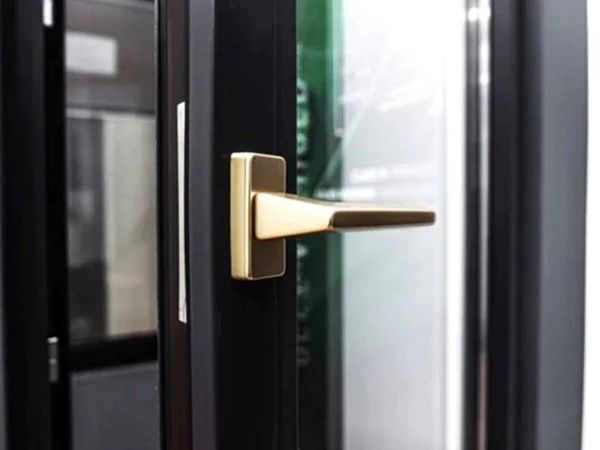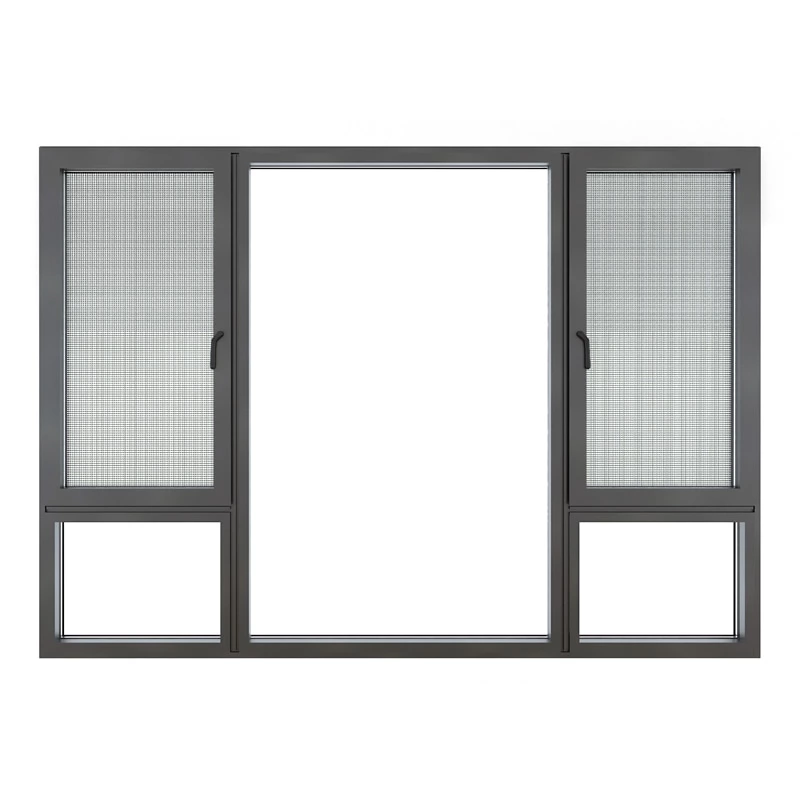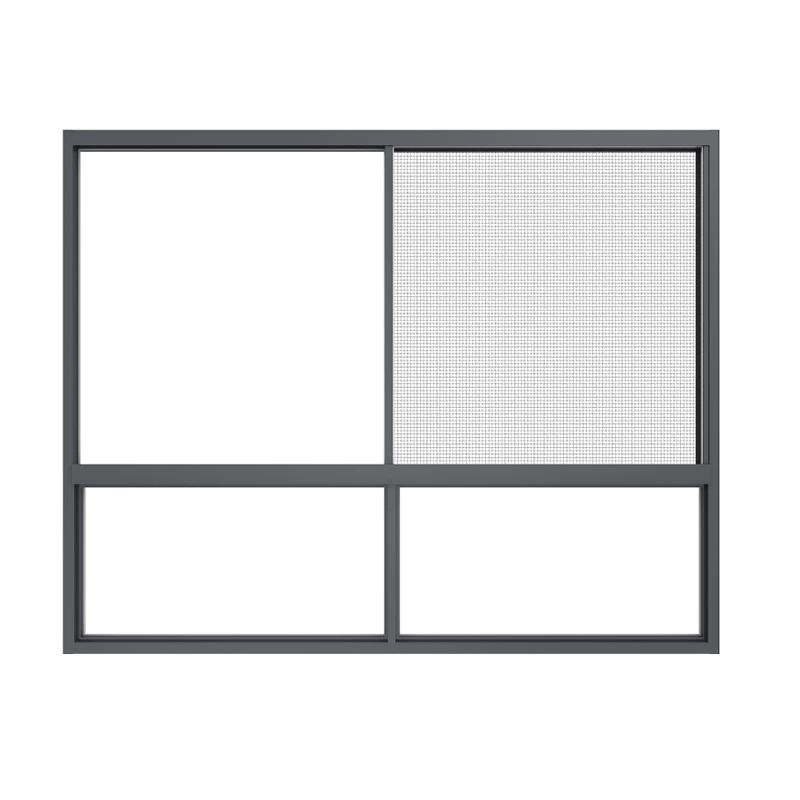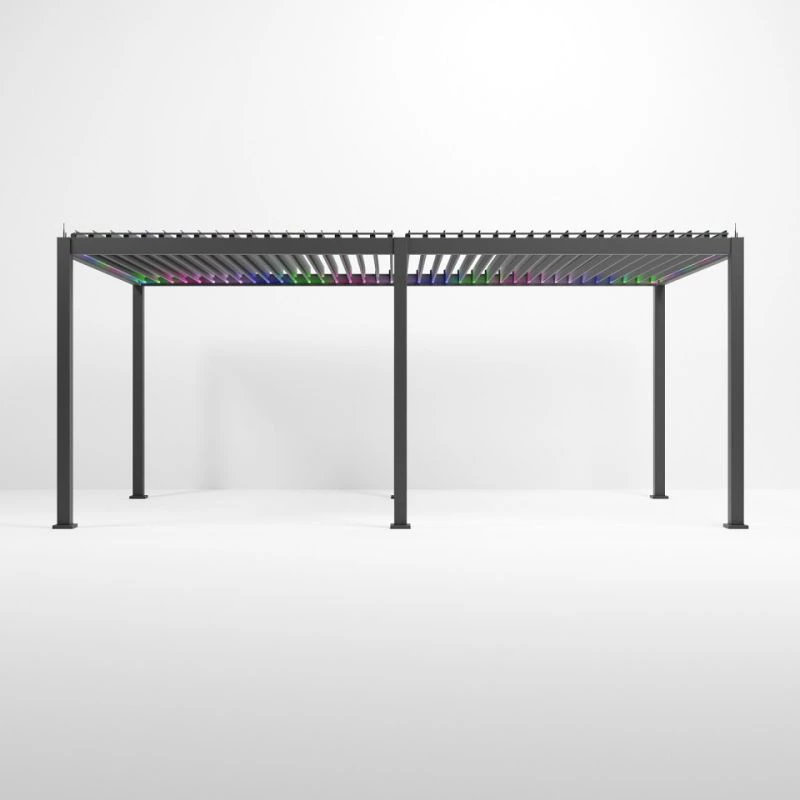Introduction
A high-quality door not only provides security for home life but also enhances sound insulation, heat preservation and overall aesthetics. Whether it's renovating a new house or refurbishing an old door, understanding the various components of a door can help with precise selection and proper maintenance, making its use smoother and extending its lifespan.
The main components of the door
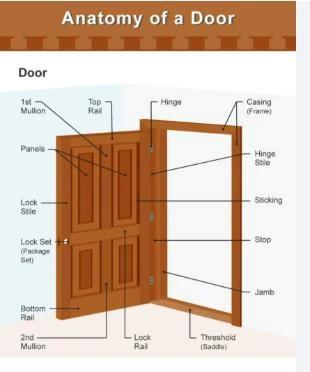
1.Door frame and door casing
Function and Characteristics The door frame is the "skeleton" of the door, bearing the weight of the door leaf and remaining vertical and straight. The door casing is used to hide the installation gap and smoothly connect with the wall.
(1)Shaft Material
Wood: The texture is natural and can be painted or veneered. Moisture-proof and insect-proof treatments need to be done well.
Aluminum alloy: It has high strength, is not prone to deformation, and is lightweight, but its sound insulation is slightly inferior.
Steel: It has strong impact resistance and is suitable for entrance doors with high safety requirements, but regular rust prevention is necessary.
(2)Key points for selection and installation
Check the verticality with a level during acceptance. Leave a gap of no less than 5 millimeters between the wall and the door frame, and fill it with waterproof and anti-mold expansion foam. After completion, apply sealant at the junction of the door casing and the wall to prevent water vapor from penetrating.
2.Hinge
(1)function declaration
Connect the door leaf with the door frame to achieve smooth opening and closing.
Determine the load-bearing capacity and usage noise of the door leaf.
(2)Types and Applications
Ordinary hinges: Economical and practical, suitable for lightweight indoor doors;
Ball hinges: Suitable for large-area and heavy-duty solid wood doors, they have a long service life and are quiet.
Self-closing hinge: Commonly found in fireproof doors or bathroom doors, it can return to its original position automatically.
(3)Maintenance Tips
Tighten the screws and apply lubricating oil every six months.
If loosening or abnormal noise occurs, replace the hinges or adjust the position in time.
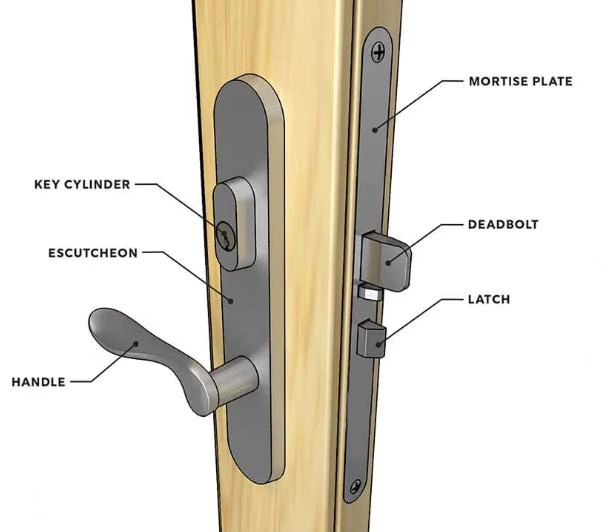
3.Locks and door bolts
(1)key role
Make sure the door leaf is firmly closed to provide protection.
(2)Lock classification
Mechanical lock: Simple in structure and easy to maintain. It is recommended for use in bedrooms and studies.
Electronic lock: Supports remote unlocking by fingerprint, password, card or mobile phone, suitable for main entrances with high security requirements.
(3)Door bolt configuration
The single-tongue door bolt has a simple structure and is easy to align when locked.
Double-tongue or multi-point lock door bolts are distributed at the top and bottom, which is safer but requires higher installation accuracy.
(4)Installation and Maintenance
When installing, measure the depth of the lock body first to ensure that the lock tongue can extend and retract freely.
Regularly check the battery power or the wear of the internal springs of the mechanical lock.
4.The door panel and the horizontal and vertical stops
(1)structure and property
The main load-bearing frame is composed of horizontal bars (horizontally) and vertical bars (vertically), with panels embedded between them.
The material of the panel affects the sound insulation, heat preservation and moisture-proof performance.
(2)Common panel types
Solid core board: Good sound insulation and heat insulation effect, heavy weight;
Honeycomb core board: With an internal honeycomb structure, it is lightweight but has slightly poor sound insulation.
Foamed core board: Filled with polyurethane or polystyrene, it has outstanding thermal insulation performance.
(3)decorative style
The flat door has a simple and modern design.
Carved panels have more traditional characteristics.
Glass inlaid doors can enhance lighting and a sense of transparency.
5.The base and the sill
(1)main function
Seal the gap between the bottom of the door and the ground to prevent water vapor, dust and small insects from entering.
Protect the bottom of the door leaf from direct friction with the ground
(2)Materials and Design
Aluminum alloy sill: Strong and wear-resistant, commonly seen at outdoor entrances;
Stainless steel sill: Corrosion-resistant, suitable for humid environments;
Plastic or composite floor sills: lightweight, waterproof and mold-resistant, often used for balcony doors.
(3)Installation Essentials
Make sure it is level and in close contact with the ground, leaving a gap of 3 to 5 millimeters when opening and closing the door leaf.
The joints should be sealed with waterproof rubber strips to prevent water seepage.
6.sealing strip
(1)common functional specifications
Fill the gaps between the door leaf, the door frame and the floor sill to enhance sound insulation and heat preservation and prevent air leakage.
(2)Select by Material
PVC sealing strips: Affordable price, suitable for general household use;
Silicone rubber sealing strips: resistant to high and low temperatures, with good elasticity, suitable for extreme climates;
Woolen sealing strips: They have strong adhesion to irregular gaps and are often used in old doors and Windows.
(3)Mounting and replacement
Clean the bonding surface before construction and ensure a straight adhesion.
Check once a year. If peeling or hardening is found, replace it in time.
7.Door lock plate and lock tongue
(1)operating principle
The lock tongue extends into the hole of the lock plate to achieve locking.
The lock plate is fixed to the door frame and bears the thrust of the lock tongue.
(2)reinforcement measure
Add metal reinforcing plates on the inner side of the door frame to enhance its anti-skid property.
Choose a thicker lock plate to prevent the screws from loosening.
(3)Debugging and Maintenance
Make sure the lock tongue is aligned with the lock plate holes and the switch is smooth.
Tighten the screws regularly and apply anti-rust oil.
8.Decorative lines and door casing lines
(1)Function and Effect
Conceal the gaps and interfaces to serve as transitions and beautifies.
It is in harmony with the lines of the walls and floors, enhancing the overall decorative effect.
(2)Material and Shape
Solid wood lines: Patterns can be carved as needed, with a high-end texture;
PVC lines: Quick installation, easy to clean, moisture-proof and durable;
Multi-layer board lines: high strength, smooth surface, easy to spray paint.
(3)construction details
The Angle at the cutting seam is precise and the splicing is tight.
After surface grinding, spray painting or film application ensures a uniform texture.
Comprehensive purchasing and maintenance suggestions
1.Select materials based on the usage scenarios and requirements
For indoor bedrooms, lightweight panels with good sound insulation performance can be given priority.
The entrance door should attach importance to impact resistance, corrosion prevention and the configuration of safety locks.
2.Regular inspection and maintenance
Lubricate the hinges and locks with oil every six months.
Clean the dust from the gap between the sealing strip and the sill to prevent jamming.
If the door leaf is deformed or does not open and close smoothly, the parts should be adjusted or replaced in time.
3.Tips for extending service life
Install with appropriate tools to avoid screws being too tight or too loose.
Avoid forcibly pushing or pulling or overloading heavy objects on the door leaf.
In a humid environment, regular moisture-proof treatment should be carried out or moisture-proof sealing parts should be installed.
Epilogue
If you have a thorough understanding of each component of the door, you will be able to "know what it is and why it is so" when purchasing, installing and maintaining. The correct combination of components and meticulous maintenance can not only enhance the comfort of use but also extend the service life of the door. It is hoped that this detailed explanation can bring practical references and inspiration to your home life.If you have the idea of replacing your doors or windows, you can visit our official website. We offer custom services. Welcome to contact us!
